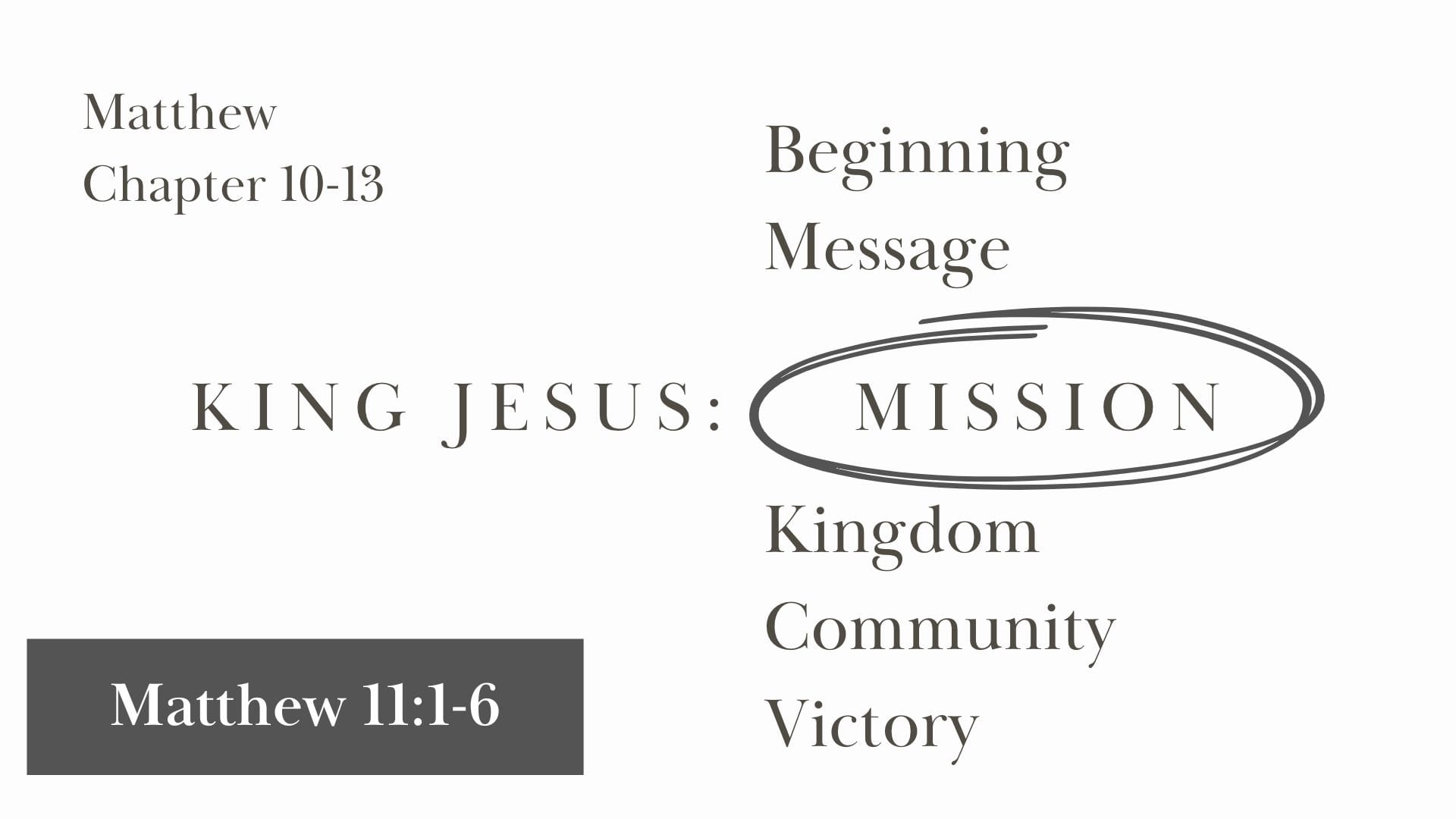Text:
When Jesus had finished giving these instructions to his twelve disciples, he went out to teach and preach in towns throughout the region. John the Baptist, who was in prison, heard about all the things the Messiah was doing. So he sent his disciples to ask Jesus, “Are you the Messiah we’ve been expecting, or should we keep looking for someone else?” Jesus told them, “Go back to John and tell him what you have heard and seen— the blind see, the lame walk, those with leprosy are cured, the deaf hear, the dead are raised to life, and the Good News is being preached to the poor.” And he added, “God blesses those who do not fall away because of me.”
As we follow Jesus, He EMPOWERS us to MAKE A DIFFERENCE.
Overall Commentary: 🌎
Jesus has now given the apostles their "rules for the road." As they head out on their first adventure, Jesus also continues His teaching ministry. The events in this passage may be more helpful than we first realize. John the Baptist has been the most outspoken supporter of Jesus from the beginning of His ministry. Now, John sends messengers to discover if Jesus truly is the Messiah. This helps us grapple with the reality that we will go through seasons of doubt and realignment. When these moments come, we must do what John did. We bring them to Jesus.
As we follow Jesus, doubt can grow in the dark but it DIES IN THE LIGHT of Jesus.
Commentary
Verse 1: The disciples go on their first missionary trip.
- Twelve disciples: This is their first chance to share the Gospel without Jesus physically being there. This is the training ground for the Great Commission.
- Jesus continues: Jesus would have continued doing what He was already doing and would have been surrounded by all the rest of His disciples.
Verse 2: John the Baptist experiences questions.
- John the Baptist: John is one of the most prominent figures in the Gospels. He even appears outside the New Testament in historical works such as the writings of Josephus. He baptized Jesus and declared Jesus the Messiah and the Lamb of God, which takes away the world's sin.
- In prison: John had been placed in prison by Herod Antipas, a son of Herod the Great. He was imprisoned for pointing out Herod's sin of adultery with his cousin's wife. At this point in Matthew 11, he has possibly been in prison for up to a year.
- Messiah- Jewish term for rightful King. The Deliverer.
- His disciples: It was common for a teacher to have disciples who would follow and learn. There are other places in the Gospels where Jesus and John's disciples would talk about each other.
Verse 3: A Good Question from a Prison Cell.
So much is happening in this question.
- Are you Him?: John is not denying the Messiah will come. John is not having a crisis of faith in general. He has questions about what Jesus is doing.
- If you are, why don't you look like Him?: The average first-century Jew had a picture of the Messiah that looked very different from Jesus. They saw Him as a political leader who would destroy the Romans and bring long-awaited victory to their nation. John had said the Messiah would baptize with fire. Jesus is not doing these things... yet. John doesn't realize that all these things are coming, but in the order he expects. John must also be wondering that, if Jesus is the Messiah, why is He not bringing judgment on the Earth right now?
Verse 4-5: Jesus' answer.
- Quoting the Messianic signs from Isaiah- The book of Isaiah has more prophecies about the coming Messiah than any other. There was a list of things Isaiah said would be signs of the Messiah. Jesus runs through the list in this text. Strikingly, Jesus leaves out Isaiah 61, which states that the captives will be released. Jesus is simultaneously telling John who He is and telling John his next steps. He is not going to be freed from prison.
Verse 6: Jesus' doesn't bend to our will.
- Blessed are the Unoffendable: Jesus gives a mild rebuke to John. In the following text, Jesus will remind people who John is and reaffirm John's status as a man of God. However, Jesus also makes sure John realizes that Jesus is in charge. You cannot get to the Kingdom any other way through Him.
What can we learn from this passage?
This passage is beneficial because we find John grappling with doubt. This permits us not to feel like we have lost our way when doubts creep in. We can also see the reasons for John experiencing doubt. There are many reasons Christians deal with doubt today, but here are some of the most common that we may share with John.
- Isolated: John is alone in prison. Many Christians who experience doubt find themselves in seasons isolated from others in the Body of Christ.
- Difficulty: A first-century Roman prison for a political jail would have been full of hardships. Many Christians who experience doubt report going through significant seasons of difficulty. This can range from financial and relational to physical issues.
- Unmet expectations: John thought the Messiah would come in and take over. The Messiah would be a general and a political leader. If all this was true, why had Jesus not deposed Herod and freed him from jail. Surely John thought he had been imprisoned so that Jesus could show His strength. Now that he has been there a while, he wonders what is happening. His expectations of Jesus have not happened. Many Christians who experience doubt have reported they feel Jesus doesn't answer their prayers or do what they think is right.
- Distant from Jesus: In prison, John hears about the good things Jesus is doing but cannot see them for himself. This distance and second-hand information leave John feeling cold and dark.
Dr. Gary Habermas has released much research helping us define different types of doubt. He says these three main types of doubt are on a sliding scale.
Factual doubt-
This is the most surface level of doubt. As the name suggests, people who struggle with factual doubt have questions regarding their faith and seek to gain more knowledge. These would be people concerned with things such as the reliability of Scripture or the existence of God in the Word. Below are some resources to help you learn more about this level of doubt.
Of those who doubt, approximately 10% are dealing with purely factual doubt. If left untreated, it will likely spiral into the next category.
- Gary Habermas on Factual Doubt. (video)
People who specialize in answering tough questions about Christianity.
- C.S. Lewis
- John Lennox
- Frank Turek
- Greg Koukl
- Gary Habermas
- J. Warner Wallace
- Sean McDowell
- Alisa Childers (Progressive Church)
- Becket Cook (LBTQ)
- Christopher Yuan (Holy Sexuality)
- Rosaria Butterfield
- Norm Geisler
- William Lane Craig
- Dr. Michael Brown
- Hugh Ross
- R. C. Sproul
Antidote:
- Seek answers from credible sources. (like the list above.)
- Start reading your Bible every day.
- Don't listen to only opposing views or views that agree with your doubts.
Emotional doubt-
If factual doubt is not dealt with, it will slowly slide into emotional doubt. As the title suggests, this type of doubt now involves our emotions. We are no longer curious about our doubts; they have become personal. This is the most painful form of doubt. This type of doubt cannot merely be fixed with facts. We also have to account for the emotional toll our doubts have caused on our souls. The way to tell if you are dealing with emotional doubt is how you relate to answers to your questions. This type of doubt affects the majority of people. This is likely for two reasons. The first is because factual doubt is left untreated. The second is because we leave our emotions unchecked and have not been taught how to place our feelings under our control correctly.
If left unchecked, emotional doubt will slide downward into the next category.
- Gary Habermas on Emotional Doubt. (video)
Antidote:
- Start reading your Bible every day.
- Find a small group. Allows your Christian brothers and sisters to walk with you.
- Seek Biblical counseling.
- Learn to feel your emotions, but live by your principles. Your emotions and anxieties will life to you.
Volitional doubt-
This is the most challenging type of doubt to overcome. This is someone who has a problem with their will. They do not want to follow God anymore or do not care. Os Guinness calls this "a time to warn." This can present in a variety of ways. The two most common are apathy and hostility. The apathetic person doesn't "feel like" being a Christian or serving God anymore. They have grown cold to the goodness of God. The other type has become hostile and would say, "God, you stay on your side of the universe, and I'll stay on mine." This is the result of sliding from factual doubt, through emotional doubt, to this low point.
- Gary Habermas on Suggestions for Volitional Doubt (video)
- Volitional Doubt (video)
- Volitional Doubt and Top Down Thinking (video)
Antidote:
- Start reading your Bible every day.
- Find a small group and get honest.
- Find motivation through seeing God's goodness. Begin to journal your thankfulness every day. Take a spiritual adventure like a missions trip.
- Warn yourself with the realities of hell. Heaven and hell are real.
Check the bottom of this blog post for additional resources.
The great news is John does the right thing. John brings his concerns to Jesus. Jesus' response to these doubts is excellent instruction for us.
- Jesus doesn't criticize John. Jesus will not disown you when you bring to Him your doubts. For all those emotional doubters, don't worry and don't feel shame about experiencing doubt. Just don't stay in that doubt. Reach out for help.
- Jesus offers proof. Jesus didn't tell them to go away and He wasn't offended by the question. He revealed Himself to them. For those who struggle with factual doubt, answers are out there. Don't stay in your doubt, seek them out.
- Jesus reminds John who the King is. Jesus kindly reminded John that Jesus "runs the play." He is in charge. This kind but sharp reminder is good for those struggling volitional doubt. You don't run the show. You're not in charge. Your very breath is a gift from God. This is a blesing and a great reminder. Also, there are many adventures for you to experience. However, you have to do it the King's Way.
Questions/Journal Prompts for reflection:
- Have you ever struggled with doubt? If so, which one?
- How can you use these resources to help someone else?
- Do you often listen to the wrong voices that bring doubt and fear needlessly?
- What is your next step?
Resources For Further Study
- Is God Ignoring Me? (Dealing with Doubt)
- How to Defeat Emotional Doubt and Depression
- Suggestions for Volitional Doubt.
- Emotional Doubt Causes.
- Emotional Doubt Relief.
- Religious Doubt Not Grounded in Core Gospel Data
- 7 Ways to Deal with Depression
- Free Book About Doubt from Gary Habermas
- Struggling with Doubt? Here are 5 Important Truths to Remember
- 5 Ways to Persist in Faith When Dealing with Doubt
General Study:
- Blue Letter Bible: Cross-Reference/Word Studies/Translations
- How to Cross-reference passages. Let the Bible interpret the Bible.
- BibleHub.com: So. Many. Tools.
- Sending Out the Twelve from Enduring Word
- Bible Study Notes: The First Mission
- Matthew Henry Commentary
- Instruction the Twelve From One Hope Fellowship
- Principles of Ministry








